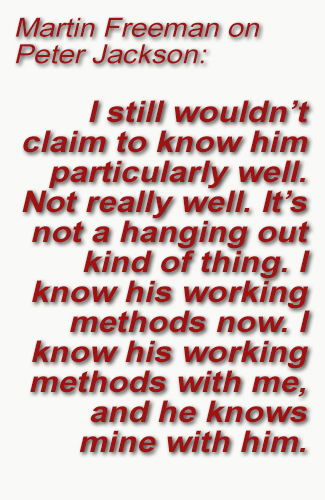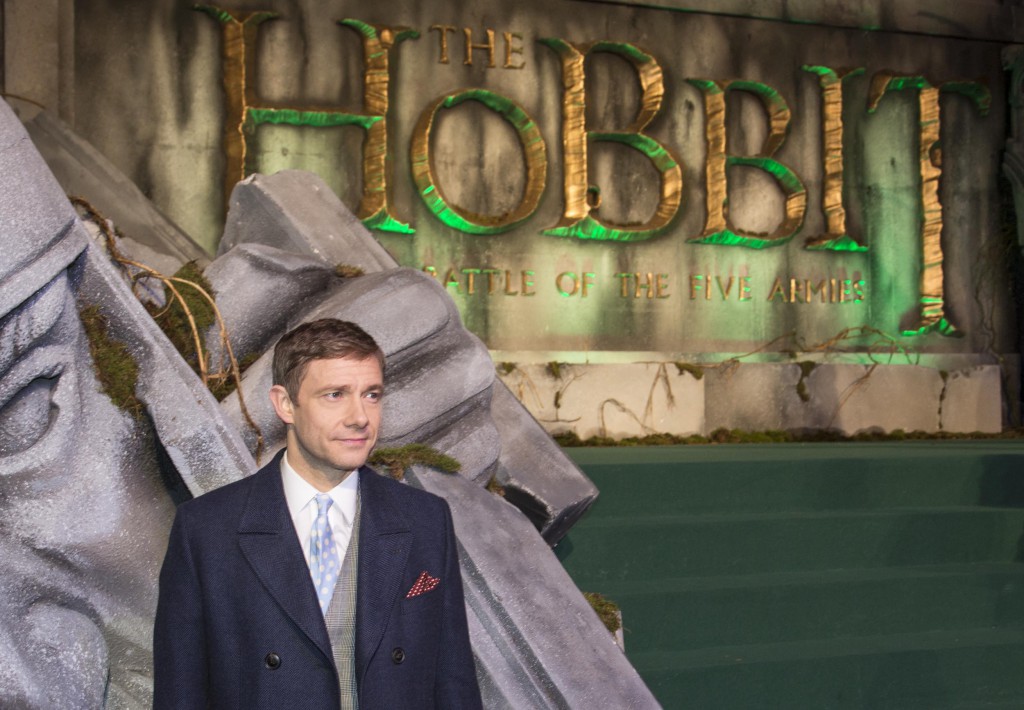WELLINGTON, NEW ZEALAND — TheOneRing.net visited the set for a brief time during the final segment of filming, nearly entirely focused on the third film, “The Hobbit: The Battle of the Five Armies.” On the day of this interview Peter Jackson was putting his characters through a highly emotional scene toward the end of the film when one or more characters was in grave peril, perhaps the gravest of peril. In fact, the scene puts the grave in grave peril.
But the production wasn’t filming the action sequence. The camera was on the other half of the scene so instead the camera was focused on Martin Freeman playing Bilbo Baggins watching the grave peril unfold. Freeman’s face and voice spoke volumes about what Bilbo was experiencing. As of press time, I haven’t seen the film so perhaps those who have will know what we watched or perhaps it didn’t make the final cut. Either way, it was an acting lesson from a genuine professional.
The year previous I spent extensive time on set and for a myriad of reasons Freeman was the sole interview of the main cast that I failed to get so I was pleased to finally be able to sit down on set, in a tent on a sound stage and interview the guy who played the title character. There were perhaps five other reporters as well. If any of the following questions from the Q&A are bad, please blame them. A foot massage* for those who can spot the questions for TheOneRing.net (hint, it wasn’t the ones about the ring or feet.) A personal observation is that Freeman is often a thoughtful interview who doesn’t deliver canned answers but I find his words here to be particularly engaging. Sadly, the interview, while reasonable in length left us wishing for more.
WARNING: Freeman uses naughty words that start with “F” and rhyme with a certain type of waterfowl. If you don’t want to read that word, don’t read this interview.
MEDIA: So, Peter was describing you as “always surprising” and talked about, sort of, the multiple takes and getting all of the different colors. What is your process when you have to do six, seven, eight takes, and each one sort of comes out differently each time?
 FREEMAN: I don’t want to get to the end of a series of takes and think that, “Oh, I never tried that.” Because you either lost your bottle or you didn’t want to look foolish or something, you know. So I’m quite happy to sort of go through choices that may be good, bad and indifferent as long as I feel like at the end of that series of takes I’ve expressed what I wanted to express.
FREEMAN: I don’t want to get to the end of a series of takes and think that, “Oh, I never tried that.” Because you either lost your bottle or you didn’t want to look foolish or something, you know. So I’m quite happy to sort of go through choices that may be good, bad and indifferent as long as I feel like at the end of that series of takes I’ve expressed what I wanted to express.
It’s partly that, and partly boredom threshold. You know, because I have a pretty low boredom threshold and I see no point in if you’ve done, you know, when you get the direction that’s perfect. Perfect, do exactly the same thing again. Why? I mean, if it was perfect. Why? If they can’t– If everything was fine, I don’t want to do it again.
MEDIA: (Two speakers overlap) Can you tell the bad and the indifferent ones when you’re in the middle of them?
FREEMAN: No, I don’t think so. I guess that’s the hard thing, is your own quality control. I would like to think of– I hope my own quality control is quite good, but it’s not always. It’s the truth of it. There’s sometimes that you do things where you think, “I think that was probably really good.” And then you look back and you think, “No, it wasn’t that great.” And then something else where the director prefers it to your own taste, and you go, “Well, yeah. I can see why they did.”
So, not always best in the middle of it, but I do sort of trust feelings. And I do trust an instinct and I think if instinctually you feel the take went very well, and in the middle of the take you know you’re– You either know you’re in it or not. And that’s always true. If that feels good. And I do tend to trust that feeling. Because I think, other ones may have been good but I know that would’ve definitely been a contender because I was really there, you know.



